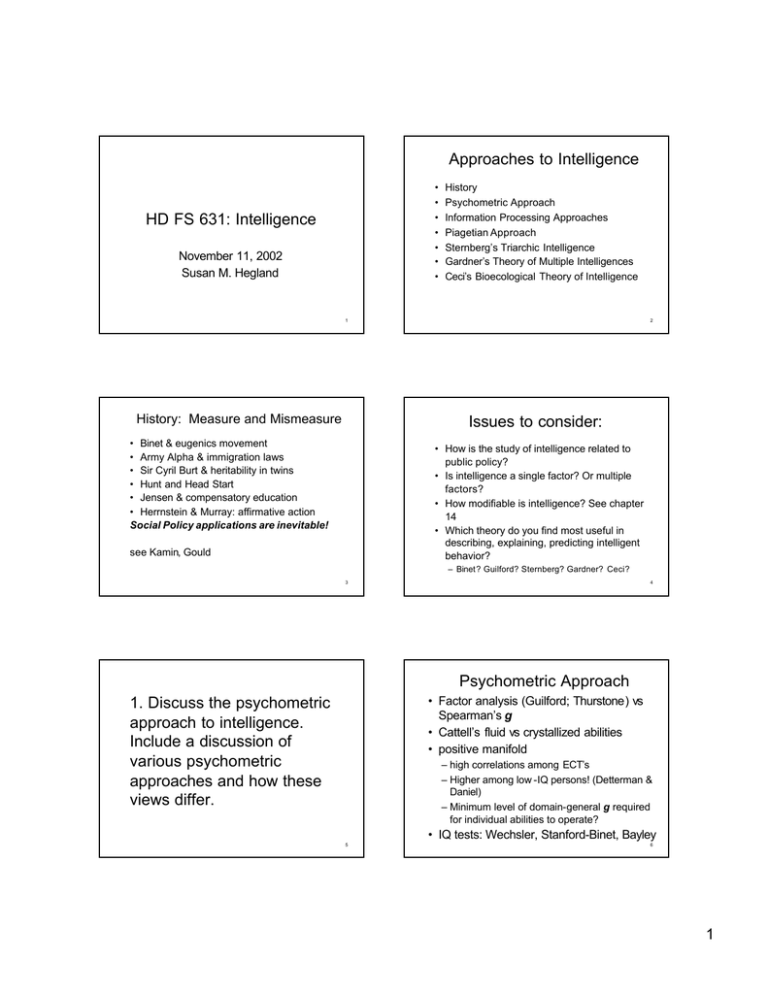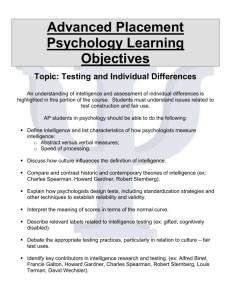Approaches to Intelligence HD FS 631: Intelligence
advertisement

Approaches to Intelligence • • • • • • • HD FS 631: Intelligence November 11, 2002 Susan M. Hegland History Psychometric Approach Information Processing Approaches Piagetian Approach Sternberg’s Triarchic Intelligence Gardner’s Theory of Multiple Intelligences Ceci’s Bioecological Theory of Intelligence 1 History: Measure and Mismeasure 2 Issues to consider: • Binet & eugenics movement • Army Alpha & immigration laws • Sir Cyril Burt & heritability in twins • Hunt and Head Start • Jensen & compensatory education • Herrnstein & Murray: affirmative action Social Policy applications are inevitable! • How is the study of intelligence related to public policy? • Is intelligence a single factor? Or multiple factors? • How modifiable is intelligence? See chapter 14 • Which theory do you find most useful in describing, explaining, predicting intelligent behavior? see Kamin, Gould – Binet? Guilford? Sternberg? Gardner? Ceci? 3 4 Psychometric Approach • Factor analysis (Guilford; Thurstone) vs Spearman’s g • Cattell’s fluid vs crystallized abilities • positive manifold 1. Discuss the psychometric approach to intelligence. Include a discussion of various psychometric approaches and how these views differ. – high correlations among ECT’s – Higher among low -IQ persons! (Detterman & Daniel) – Minimum level of domain-general g required for individual abilities to operate? • IQ tests: Wechsler, Stanford-Binet, Bayley 5 6 1 Sternberg’s Triarchic Intelligence • Contextual subtheory – Cultural relativism 2. Compare and contrast Sternberg’s triarchic theory of intelligence and Gardner’s theory of multiple intelligences. • Experiential subtheory – Ability to deal with novelty – Automatization • Componential subtheory – Metacomponents (monitoring) – Performance components (encoding, retrieval) – Knowledge Acquisition (attending, etc.) 7 Gardner’s Theory of Multiple Intelligences Seven Frames of Mind: • linguistic, logical-mathematical, musical, spatial, bodily kinesthetic, interpersonal, intrapersonal Criteria: • • • • Potential isolation by brain damage Existence of savants & prodigies Identifiable core operation / set of operations Distinct developmental history; definable set of expert end-state performances • Evolutionary history & plausibility • Support from psychometric findings • Susceptibility to encoding in a system 8 3. Discuss the importance of context to intelligence. How important is context in the psychometric, Piagetian, and information processing theories? How important is context in the theories of Sternberg, Gardner, & Ceci? 9 Information Processing Approaches 10 Piagetian Approach Strategies (Campione) Knowledge Base (Schneider) • Experts vs Novices • Differences in rate of development (Keating) • Discrepant findings: Keating vs Kuhn – Chunk information differently – Attend to different features Speed of Information Processing (Kail) • Similar RT’s across variety of tasks • Efficiency of retrieval from LT memory Metacognition (Borkowski; Pressley) 11 12 2 Ceci’s Bioecological Theory of Intelligence Can a test of intelligence be culture-free? Culture-fair? • Knowledge • Motivation to try hard • Communication skills • Rapport with adult • Familiarity with testing situation Are schools culture free? Culture fair? • Intelligence is multifaceted set of abilities • Significance of context in determining intellectual functioning – physical, social, mental, & historical • Domain specificity exists • Performance influenced by motivation, expectations, and background knowledge 13 14 3

